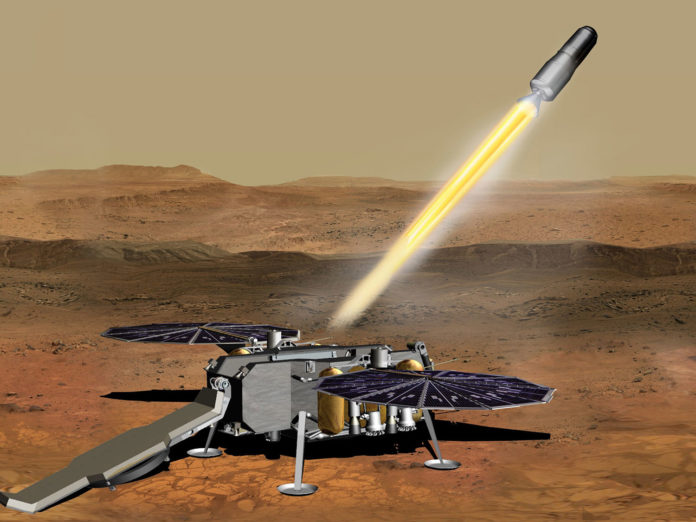NASA announced that it has selected the aerospace company Lockheed Martin to build the Mars Ascent Vehicle (MAV), a small, lightweight rocket that will launch rock, sediment, and atmospheric samples from the surface of the Red Planet. The contract brings NASA a step closer to the first robotic round-trip to bring samples safely to Earth through the Mars Sample Return program. If successful, Lockheed Martin’s rocket could become the first to launch from another planet.
The MAV is a crucial part of a campaign to retrieve samples collected by NASA’s Perseverance rover and deliver them to Earth for advanced study. The project is already well underway, thanks to NASA’s Perseverance rover, which successfully landed on Mars in February 2021. The six-wheeled robot has gathered a handful of samples so far and will eventually leave them on the surface of the Red Planet to be picked up later.
NASA’s Sample Retrieval Lander (SRL), another important part of the campaign, would carry the MAV to Mars’ surface, landing near or in Jezero Crater to gather the samples cached by Perseverance. The samples would be returned to the lander, which would serve as the launch platform for the MAV.
With the sample container secured, the MAV would then launch. Once it reaches Mars orbit, the container would be captured by an ESA (European Space Agency) Earth Return Orbiter spacecraft outfitted with NASA’s Capture, Containment, and Return System payload.
The spacecraft would bring the samples to Earth safely and securely in the early- to mid-2030s. Once on Earth, they can be studied by state-of-the-art tools too complex to transport into space.
The MAV must be robust enough to withstand the harsh Mars environment and adaptable enough to work with multiple spacecraft. It also must be small enough to fit inside the Sample Retrieval Lander. The Sample Retrieval Lander is planned for launch no earlier than 2026 from NASA’s Kennedy Space Center in Florida.
“This groundbreaking endeavor is destined to inspire the world when the first robotic round-trip mission retrieves a sample from another planet – a significant step that will ultimately help send the first astronauts to Mars,” NASA Administrator Bill Nelson said. “America’s investment in our Mars Sample Return program will fulfill a top priority planetary science goal and demonstrate our commitment to global partnerships, ensuring NASA remains a leader in exploration and discovery.”
Lockheed Martin Space will provide multiple MAV test units and a flight unit. The cost-plus-fixed-fee Mars Ascent Vehicle Integrated System (MAVIS) contract – which includes designing, developing, testing, and evaluating the integrated MAV system and designing and developing the rocket’s ground support equipment – has a potential value of $194 million. The performance period begins no later than February 25 and will extend six years.
